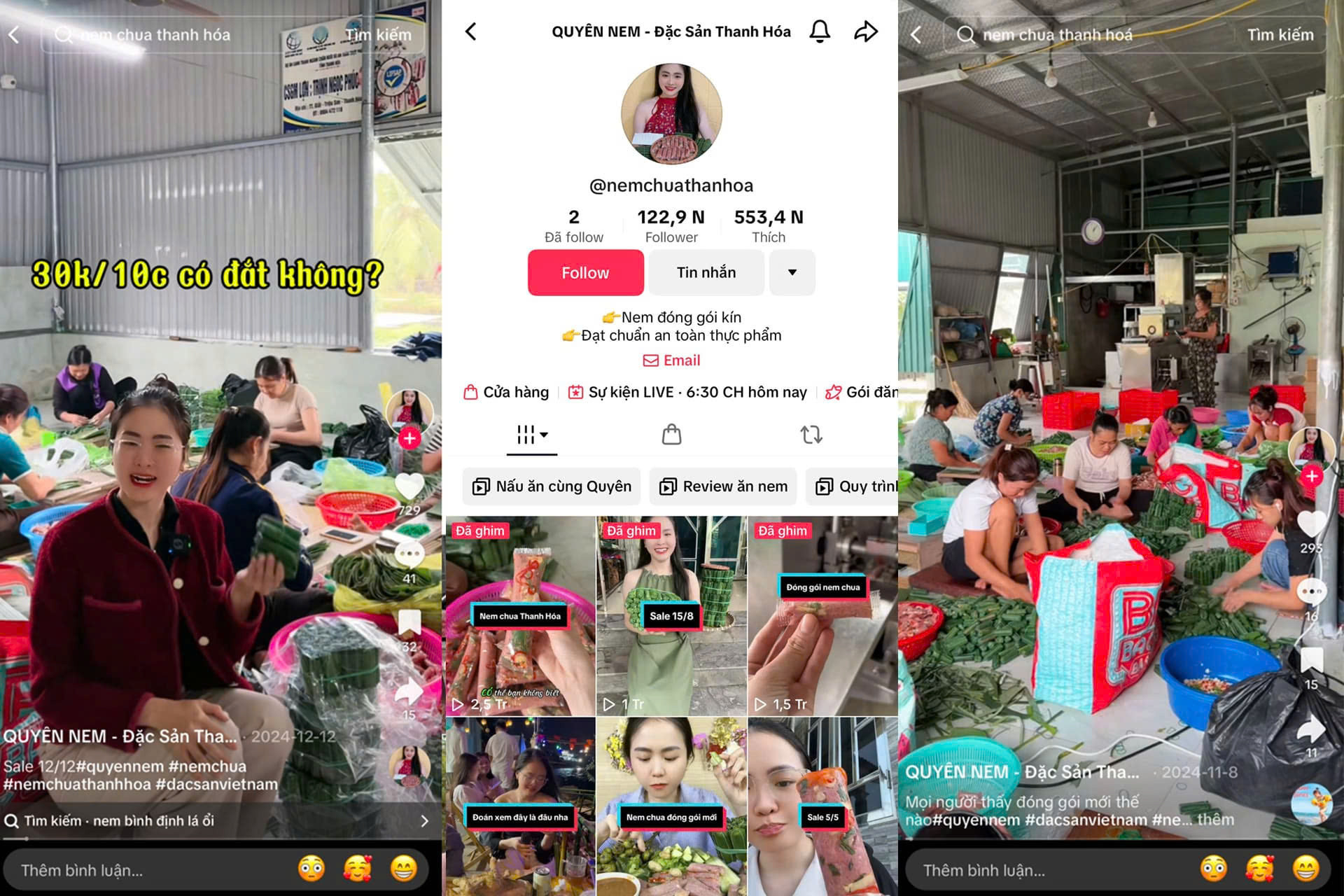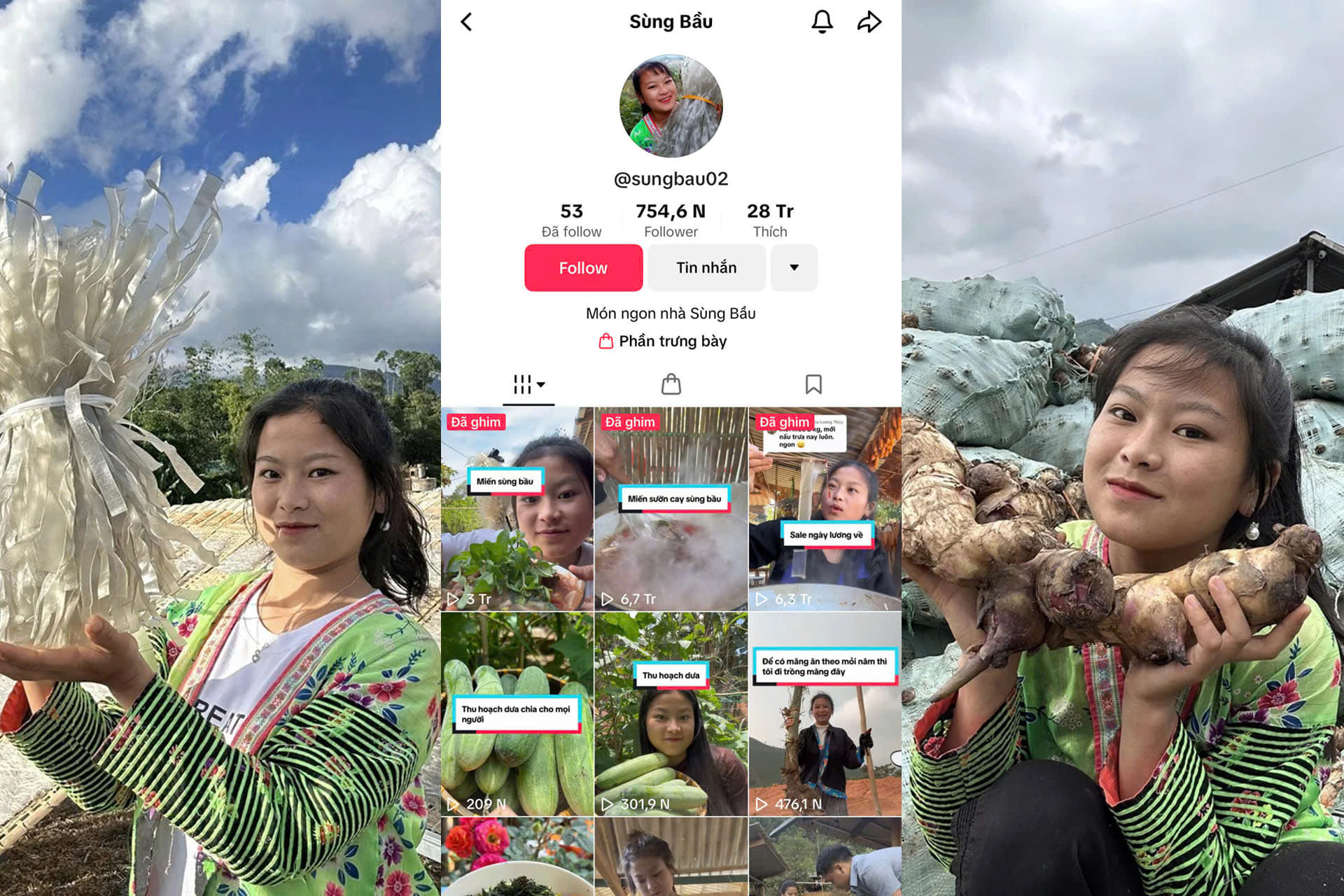By effectively leveraging digital platforms like TikTok Shop, livestreams, and even artificial intelligence (AI), many young people are transforming how traditional local specialties are sold, turning hometown delicacies into viral and high-demand products.
Leaving the city behind to livestream fermented pork roll sales
Without the need for middlemen, a Gen Z entrepreneur sold 2,000 fermented pork rolls in just two minutes - marking the digital era of traditional agricultural products.
Quyen Luyen, born in 2002 and a former student of electronic and computer engineering, gave up her urban ambitions to return to her hometown and launch a business centered around Thanh Hoa’s signature dish - fermented pork rolls.

One of Quyen’s videos, created using ChatGPT suggestions, received 2.5 million views and nearly 50,000 interactions. Photo: TikTok
Starting with just a smartphone and CapCut Pro editing software, Quyen filmed and edited her own clips showcasing the making of fermented pork rolls. She also livestreamed to share product experiences and interact directly with viewers.
Without a professional crew or elaborate studio, Quyen used available technology and creativity to build her personal brand, “Quyen Nem - Thanh Hoa Specialty,” on TikTok Shop.
The Gen Z seller shared, “I use ChatGPT to script videos, suggest camera angles, and even generate daily content. AI helps me save time and stay on trend.”
Selling fresh food products like fermented pork rolls requires optimal packaging and logistics. Quyen invested in vacuum sealing machines and carefully studied platform regulations to ensure quality standards were met.
She continually upgraded her skills in e-commerce operations, product descriptions, and data-driven sales strategy adjustments.
Thanks to her adaptability, curiosity, and innovative mindset, “Quyen Nem” experienced a breakthrough - from just a few orders a week to thousands per month.
Currently, around 95-100% of her revenue comes from TikTok Shop, generating approximately USD 78,000 to USD 117,000 monthly, and up to USD 156,000 during peak periods like Tet (Lunar New Year).
Notably, in September 2024, by applying digital tools and modern sales strategies, Quyen sold 2,000 orders of fermented pork rolls in just two minutes during a livestream collaboration with other KOLs.
Young entrepreneurs like Quyen are redefining their roles, not just as sellers but as “digital merchants” who connect hometown specialties to consumers via video, livestreams, and AI.
Thanks to technology, each region can become a recognizable brand, and each local delicacy can reach national and even international markets.
“Technology doesn’t replace people, but it helps us grow faster and smarter. Ideas might run dry, but AI can help map out strategies every day. What matters is using it wisely and at the right time,” Quyen said.
The digital journey of H'Mong handmade vermicelli

The H’Mong girl uses digital tools to spread the story of northern highland vermicelli, winning hearts online. Photo: TikTok
Not only fermented pork rolls from Thanh Hoa, but also handmade arrowroot vermicelli from Dien Bien, which used to suffer from unstable prices due to traditional sales methods, has entered the digital era.
Thanks to a young couple, Hang A Tu and Sung Thi Bau, who introduced their products via TikTok Shop, “Sung Bau vermicelli” now sees 100–200 orders in just a few hours of livestreaming.
“The hardest part is the unstable internet and lack of modern equipment. In a remote area like Dien Bien, it’s a huge challenge to access technology,” said Sung Bau.
Undeterred by limitations, with just a familiar smartphone and a few simple editing apps, they gradually carved out a place on digital platforms, increasing their income and promoting their local specialty more effectively.
E-commerce platforms and livestream sessions are not just about selling products. They are storytelling stages where young people use technology to connect consumers with products and the people behind them.
Stories like Quyen Nem and Sung Bau show that digitization has reached even remote villages, empowering locals to become tech-savvy entrepreneurs, transforming traditional goods into global commodities.
Ha Thuong